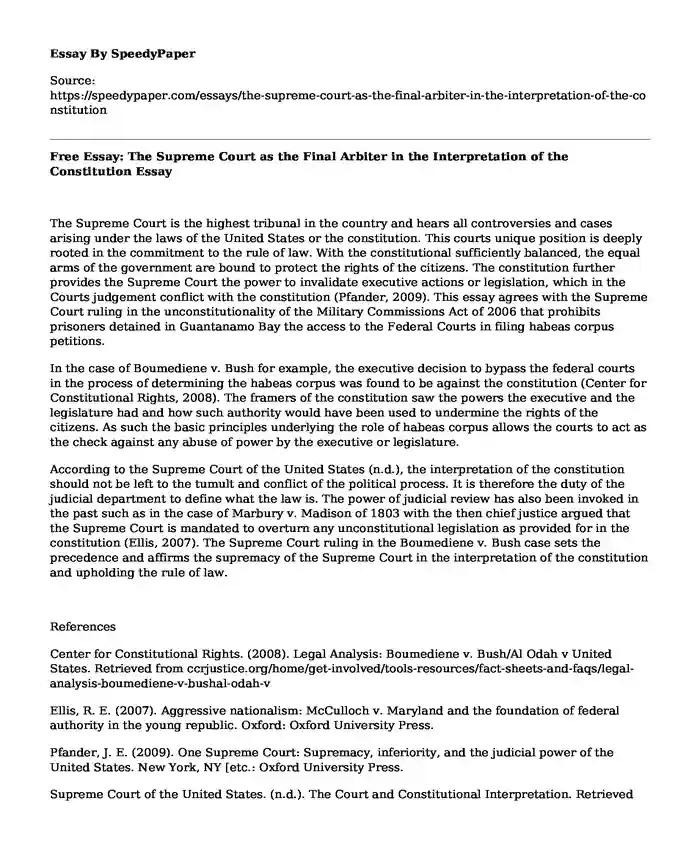
| Type of paper: | Essay |
| Categories: | Court system Constitution |
| Pages: | 2 |
| Wordcount: | 432 words |
The Supreme Court is the highest tribunal in the country and hears all controversies and cases arising under the laws of the United States or the constitution. This courts unique position is deeply rooted in the commitment to the rule of law. With the constitutional sufficiently balanced, the equal arms of the government are bound to protect the rights of the citizens. The constitution further provides the Supreme Court the power to invalidate executive actions or legislation, which in the Courts judgement conflict with the constitution (Pfander, 2009). This essay agrees with the Supreme Court ruling in the unconstitutionality of the Military Commissions Act of 2006 that prohibits prisoners detained in Guantanamo Bay the access to the Federal Courts in filing habeas corpus petitions.
In the case of Boumediene v. Bush for example, the executive decision to bypass the federal courts in the process of determining the habeas corpus was found to be against the constitution (Center for Constitutional Rights, 2008). The framers of the constitution saw the powers the executive and the legislature had and how such authority would have been used to undermine the rights of the citizens. As such the basic principles underlying the role of habeas corpus allows the courts to act as the check against any abuse of power by the executive or legislature.
According to the Supreme Court of the United States (n.d.), the interpretation of the constitution should not be left to the tumult and conflict of the political process. It is therefore the duty of the judicial department to define what the law is. The power of judicial review has also been invoked in the past such as in the case of Marbury v. Madison of 1803 with the then chief justice argued that the Supreme Court is mandated to overturn any unconstitutional legislation as provided for in the constitution (Ellis, 2007). The Supreme Court ruling in the Boumediene v. Bush case sets the precedence and affirms the supremacy of the Supreme Court in the interpretation of the constitution and upholding the rule of law.
References
Center for Constitutional Rights. (2008). Legal Analysis: Boumediene v. Bush/Al Odah v United States. Retrieved from ccrjustice.org/home/get-involved/tools-resources/fact-sheets-and-faqs/legal-analysis-boumediene-v-bushal-odah-v
Ellis, R. E. (2007). Aggressive nationalism: McCulloch v. Maryland and the foundation of federal authority in the young republic. Oxford: Oxford University Press.
Pfander, J. E. (2009). One Supreme Court: Supremacy, inferiority, and the judicial power of the United States. New York, NY [etc.: Oxford University Press.
Supreme Court of the United States. (n.d.). The Court and Constitutional Interpretation. Retrieved from http://www.supremecourt.gov/about/constitutional.aspx
Cite this page
Free Essay: The Supreme Court as the Final Arbiter in the Interpretation of the Constitution. (2019, Oct 08). Retrieved from https://speedypaper.com/essays/the-supreme-court-as-the-final-arbiter-in-the-interpretation-of-the-constitution
Request Removal
If you are the original author of this essay and no longer wish to have it published on the SpeedyPaper website, please click below to request its removal:
- Siberian Tiger Essay Example
- Slavery Essay Sample: African Slaves to New World
- Essay Sample on Fugitive Slaves and Fugitive Slave Act
- Essay Example of Walt Whitman
- Free Essay on Early Childhood Education Programs: Vision, Mission, and Philosophy
- Free Essay with Comprehensive Analysis of the Nissan Case Study
- Silicon Valley Disruption: Unveiling Promises and Realities in Uber and Airbnb Era - Free Report
Popular categories




